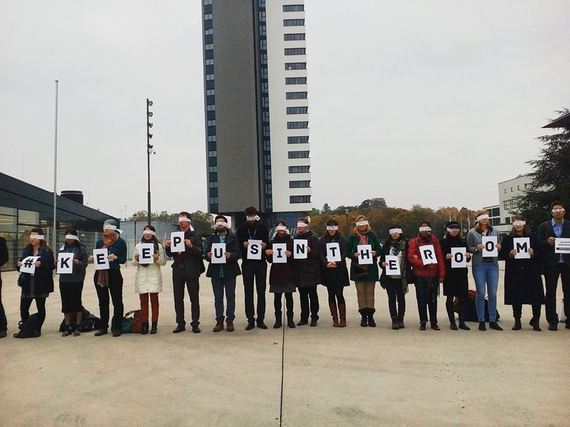Bonn, Germany -- A protest happened early Wednesday morning, the third day of the climate negotiations in Bonn, after civil society faced a lock out from the climate negotiations on Tuesday. Protesters were blindfolded holding letters that spelled out #KeepUsInTheRoom as negotiators and delegates went inside the conference center.
After a painful first day of the negotiations where most countries rejected the original draft of the text presented by the co-chairs of the negotiations, a new draft was created after additional insertions were allowed. The insertions were seen as crucial for the negotiations to move forward. Negotiating blocks such as the G77, Alliance of Small Island States (AOSIS), the Africa group, and the Like Minded Developing Countries (LMDC) have called the original text "lopsided" and "imbalanced" and serves the interests of rich countries like the United States.
After the insertions, developing countries saw loss and damage, human rights, and gender equality back in the text. Elenita Daño, Asia Director of Erosion, Technology and Concentration (ETC) calls this as "developing countries reclaiming the text."
However, much to the disappointment of civil society and other countries like Malaysia, the co-chairs decided that the negotiations will be closed to civil society and would only be restricted to negotiators. This decision was supported by Japan who said that "real negotiations never happen in front of the public." The United States (US) and the European Union (EU) also supported locking out civil society from the negotiations.
"Observers have invested great deal of time, money and intellect. On what basis do we exclude them?," says Malaysia, who opposed the closed-door negotiations.
Accredited civil society groups are usually allowed inside negotiations where they can observe the process and listen to the negotiators as they speak. This process allows for transparency of the negotiations.
"This is integral since climate change involves the whole world and not just diplomats. It concerns humanity at large. Why aren't observers allowed in spin-offs? We don't need to be afraid of civil society. We are accountable to them," Malaysia added. G77 and China also requested for the spin-off groups to be open to observers. Spin-off groups refer to parallel meetings that tackle specific parts of the negotiating text.
As the third day of negotiations begin with civil society still not allowed inside, the issue was brought to social media with a protest petition called #KeepUsInTheRoom.
Civil society groups have also spoken up against the lockout.
"Our presence signals an atmosphere of openness and willingness to stand up to public scrutiny. Blocking us shows the opposite." said Gita Parihar, Head of Legal at Friends of the Earth International.
"We are disappointed. There is historical reminder that the UN have been created on the basis that transparency is needed to achieve a democratic world. Secret negotiations is harmful for democracy. This is a slap in the face for us who believe UN is a place where fair deals can be achieved," Anabella Rosemberg of the International Trade Union Confederation said.
Noelene Nabulivou from Fiji, speaking in behalf of the Women and Gender Constituency, says, "I am from Fiji and in the frontlines of climate change. It's absolutely imperitive that I would like to have access as I can in the negotiations. This is a climate agreement for all the peoples of the world by all the peoples all the world. In order for us to have a climate change agreement that is just, we have to be inside the rooms."
Negotiating blocks AOSIS, Least Developed Countries (LDC), and Africa group have since showed strong support for civil society participation and a transparent process. Seyni Nafo speaking in behalf of the Africa group said they will make a proposal to the G77 to stop the negotiations until civil society is allowed to go back inside the negotiating rooms.
